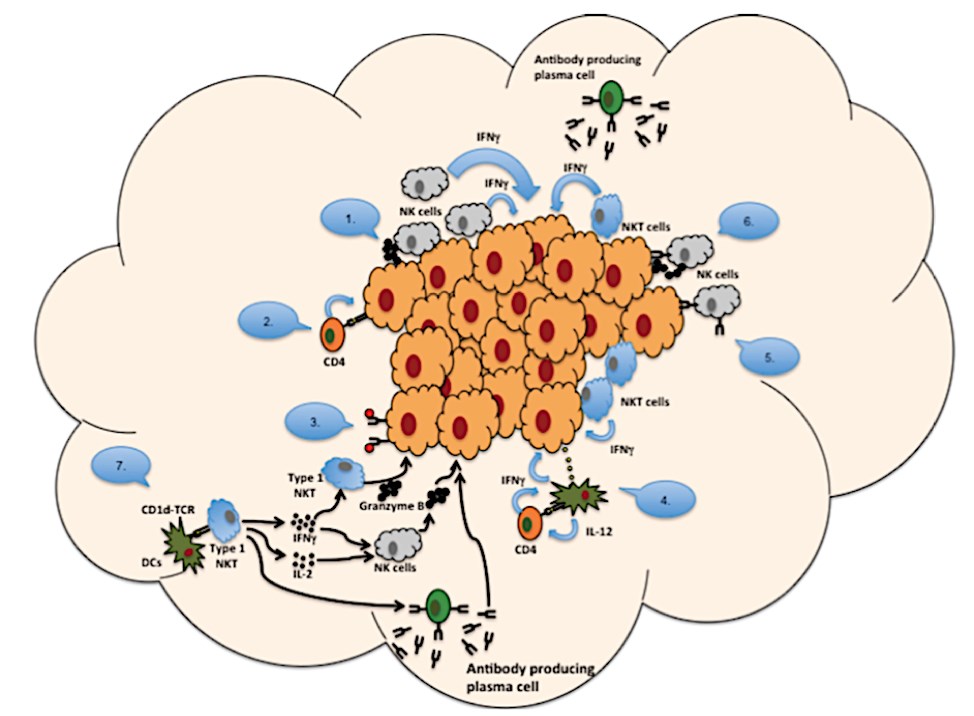Immune Cell-mediated Anti-tumor Effect Study
Gene therapy-based I-O drugs seek to recruit an effective immune response to eliminate tumor cells. The cytotoxic T lymphocyte (CTL) has been proposed as the primary effector function necessary for tumor regression, especially the CD8+ T cell cytotoxic activity. Of course, there is increasing evidence indicating that components of the immune system other than CD8+ T cells also play important roles in tumor eradication and control, such as natural killer (NK) cells, B cells and cytotoxic CD4+ T cell, etc. It's vital to identify the anti-tumor activity of gene therapy-based I-O products. Based on the outstanding expertise and rich experience, Creative Biolabs is able to provide a variety of in vitro assays to validate the immune cell-mediated anti-tumor effect of your I-O products.
 Figure 1. Mechanisms used by immune cells to attack tumors. (Pluhar, 2015)
Figure 1. Mechanisms used by immune cells to attack tumors. (Pluhar, 2015)
Featured Immune Cell-mediated Anti-tumor Effect Study
We provide the mixed lymphocyte tumor reactivity (MLTR) assay to assess the immunological response between lymphocytes and tumor cells in vitro. The MLTR assays can determine the induction of primary immune responses to tumor-associated cell-surface antigens and generate T-lymphocytes that are cytotoxic to specific tumor cell types.
Creative Biolabs is able to offer powerful in vitro immune cell-mediated tumor lysis assay to validate the antitumor activity of lymphocytes. The co-cultured ratio of target tumor cells and lymphocytes will be optimized in the assay. In addition, the target tumor cells are also labeled and monitored at a real-time level to measure the tumor cell lysis.
Gene therapy-based I-O drugs including the bispecific antibodies and T-cell engineering antigen receptors take advantage of T-cell potency in cancer therapy by redirecting them against tumors. We can conduct high-quality redirected cytotoxic activity assay to test the lymphocyte antitumor activity.
Apoptotic tumor cells are able to prime the antitumor immune response and increase the proliferative ability of tumor-specific T cells. At the end of the immune response, apoptosis drastically reduces the numbers of activated T cells. Apoptosis is a highly regulated process and we offer several assays that can assess the different stages of apoptosis.
Phagocytosis is an important physiological activity of specialized immune cells including macrophages, neutrophils, and dendritic cells. GTOnco™ phagocytosis assay services are designed to help you analyze the function of these specialized immune cells and evaluate the effect of I-O drugs in gene therapy.
At Creative Biolabs, we are committed to providing efficient in vitro validated platforms for your immune cell-mediated anti-tumor effect study. Contact us today for free expert advice and we welcome the opportunity to discuss your requirements and answer your questions.
Reference
- Pluhar, G.; et al. (2015). CD8+ T Cell-Independent Immune-Mediated Mechanisms of Anti-Tumor Activity. Critical Reviews in Immunology, 35(2), pp.153-172.
